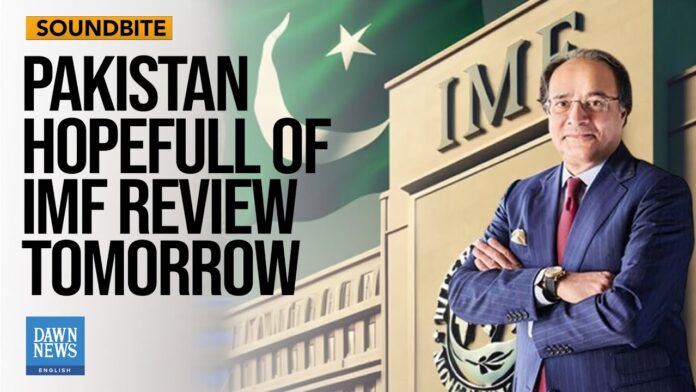Pakistan’s Finance Minister Aurangzeb expresses confidence in IMF board’s approval of a critical economic program
In a significant development for Pakistan’s economic landscape, Finance Minister Senator Muhammad Aurangzeb expressed strong optimism regarding the approval of a 37-month, $7 billion Extended Fund Facility (EFF) arrangement by the International Monetary Fund (IMF). Speaking at the “High-Level Private Sector Dialogue – CPEC-II and the Region” via Zoom, Aurangzeb emphasized the importance of this arrangement for the country’s financial stability.
The IMF board meeting, scheduled for Wednesday, holds great significance as it follows the successful conclusion of a nine-month Standby Agreement (SBA) with the IMF. Aurangzeb stated, “We are very hopeful the board would approve the 37-month $7 billion programme.” His remarks underscored the government’s commitment to implementing crucial structural reforms across various sectors, including taxation, energy, and state-owned enterprises.
The finance minister expressed gratitude to China, acknowledging its unwavering support for Pakistan amidst the ongoing economic challenges. He highlighted the improvements in Pakistan’s economic indicators, noting a stable currency, stable foreign exchange reserves with two months of import cover, and a decrease in inflation rates. He pointed out that the decline in policy rates and Kibor rates would benefit the industrial sector significantly.
Aurangzeb further revealed the government’s recent decision to reject Treasury Bills (T-bills) and Pakistan Investment Bonds (PIBs). He explained that this choice was strategic, signalling the government’s determination to move away from domestic borrowing under desperate conditions. Instead, the government aims to borrow on its own terms, encouraging the banking sector to focus on lending to the private sector.
While the finance minister acknowledged the need for domestic borrowing if necessary, he also welcomed investment inflows in the form of debt and equity to attract foreign direct investment (FDI). He emphasized that establishing macroeconomic stability is essential and asserted that the government has laid a solid foundation for promoting economic resilience.
As the world watches closely, the outcome of the IMF board meeting will have profound implications for Pakistan’s economy. The approval of the EFF program could pave the way for enhanced economic growth and recovery, further bolstered by the government’s commitment to necessary reforms and stability measures.
Analysis
Political Perspective
The potential approval of the $7 billion EFF arrangement represents a crucial turning point in Pakistan’s political and economic landscape. The government’s proactive approach in negotiating with the IMF demonstrates a commitment to securing foreign aid essential for stabilizing the economy. The political implications of this arrangement extend to the ruling government, as successful negotiation and implementation of structural reforms may bolster public confidence and support. Conversely, failure to meet IMF conditions could lead to political fallout and decreased public trust in the government’s economic management.
Social Perspective
The social ramifications of the EFF arrangement are significant, as it directly impacts the livelihood of millions of Pakistanis. Structural reforms mandated by the IMF, particularly in taxation and energy, can lead to both positive and negative consequences for society. While these reforms may foster long-term economic growth and stability, they may also impose short-term hardships on vulnerable populations. Social unrest and dissatisfaction can arise if the government fails to manage these changes effectively or if citizens perceive reforms as disproportionately benefiting the wealthy.
Racial Perspective
The economic challenges faced by Pakistan often intersect with issues of ethnic and regional disparity. Disparities in resource distribution and access to economic opportunities can lead to tensions among different ethnic groups. The government’s approach to structural reforms must consider these dynamics to ensure that benefits are equitably shared across all communities. If the EFF program fosters inclusive growth, it can contribute to social cohesion and reduce ethnic tensions.
Gender Perspective
The economic reforms associated with the IMF’s EFF arrangement present opportunities for enhancing gender equity in Pakistan’s economy. Women have historically faced barriers to economic participation, and targeted reforms in the labor market and access to finance can empower women entrepreneurs and workers. By prioritizing gender-responsive policies, the government can leverage the EFF program to promote gender equality, which is essential for sustainable economic development.
Economic Perspective
From an economic standpoint, the approval of the $7 billion EFF arrangement is pivotal for restoring investor confidence and fostering macroeconomic stability. The government’s commitment to structural reforms across various sectors is crucial for attracting foreign direct investment (FDI) and facilitating sustainable growth. The emphasis on stabilizing the currency, controlling inflation, and enhancing the overall economic environment will play a key role in revitalizing Pakistan’s economy and achieving long-term development goals.
In conclusion, the potential approval of the IMF’s EFF program signifies a critical juncture for Pakistan, intertwining political, social, racial, gender, and economic dimensions. The government’s ability to navigate these complexities while implementing necessary reforms will determine the effectiveness of the EFF arrangement in promoting economic stability and growth.
